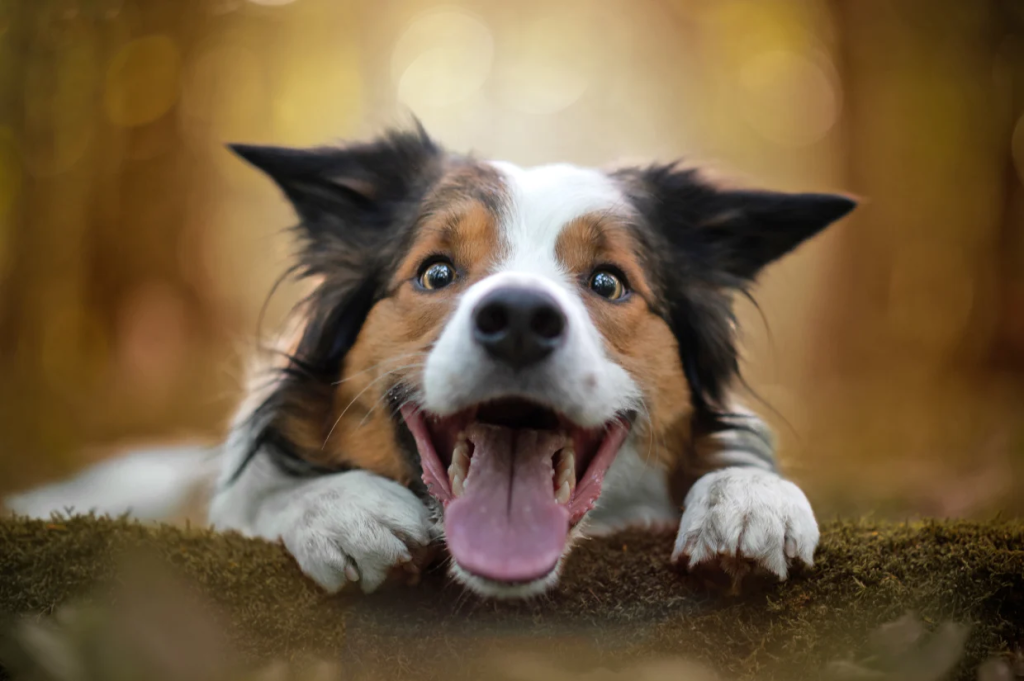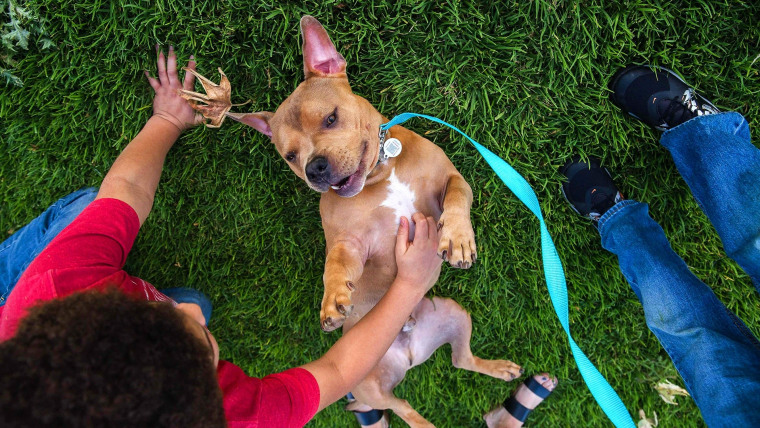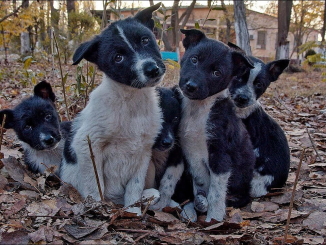Canine eggheads enjoy playing with toys and retrieving objects.

“Gifted” dogs, who have a rare talent for learning lots of words for objects easily, also turn out to be more playful than other dogs, a new study finds.
Prior research in humans has shown a link between playfulness and problem-solving abilities, so animal behavior researchers from Eötvös Loránd University in Budapest, Hungary, wondered if the same was true for rollicking pups.
What is a gifted dog? In the new study, it was Border collies who had proven in prior research that they were able to learn as many as 12 new words per week and then retain them for months.
To take a closer look at the possible association between giftedness and playfulness in dogs, Claudia Fugazza, a researcher in the university’s department of ethology (the study of animal behavior), and her colleagues asked the owners of 165 Border collies to fill out dog personality questionnaires. Twenty-one of the dogs were gifted and the other 114 were just randomly selected with no testing for word learning ability.
The surveys assessed the personality of the animals in five categories:
- Fearfulness, including fear of people, nonsocial fear, fear of dogs, fear of handling.
- Aggression toward people, including general aggression and aggression in certain situations.
- Activity/Excitability, including excitability, playfulness, active engagement and companionability.
- Responsiveness, such as trainability and controllability.
- Aggression toward animals, including aggression toward dogs, prey drive and dominance over other dogs.
For the evaluation of playfulness the owners were asked to rate their dogs in three areas:
- Dog gets bored in play quickly.
- Dog enjoys playing with toys.
- Dog retrieves objects, such as balls, toys and sticks.
The researchers focused solely on Border collies because earlier experiments found that the breed is more likely to be good at learning new words compared to others.
After collecting the survey responses, the researchers then compared the responses from owners of gifted dogs to those from the owners of dogs who had not been identified as gifted.
Playfulness was the only personality trait that was consistently different between the two groups.
It’s not clear from the study whether it’s the playfulness that helps the dogs learn more words, or whether the extra playful ones ended up with more opportunities to learn, said Fugazza, the study’s lead author, said in an email. That’s because gifted dogs tend to learn words for objects when their owners are playing with them.
Are playful dogs smarter?
Not exactly.
“Intelligence is the result of diverse cognitive traits that allow individuals to flexibly solve different types of problems,” Fugazza explained. “Giftedness refers to an extremely good capacity in the case of a specific skill.”
So, maybe gifted dogs are like people who score high on the verbal part of the SATs.
If your pup doesn’t learn words easily, it doesn’t mean it’s a dumb dog. Adam Boyko, an expert in canine genomics, reassures owners that canine intelligence is more than that.
“Both dogs and wolves are playful when they are puppies, but dogs really evolved to living in the human environment and to responding to social cues,” said Boyko, a specialist in the genetics of behavior and an associate professor at the Cornell University College of Veterinary Medicine. “It’s not surprising that the more playful ones exhibit better learning in the domain of learning human words. And it’s not surprising that Border collies, who are bred to respond to human cues, show the propensity to learn words more than other breeds.”

Other breeds of dogs might show intelligence in other ways, Boyko said. For example, wolves are very intelligent although they don’t typically pick up on human cues.
“But they can figure out how to escape,” said Boyko. “Where dogs would look for a person to help, wolves would see how humans did a latch and lock and then the wolves would do it themselves to get out.”
Boyko would like to take the study a step further and look at the genetics of the gifted dogs.
“This is a tantalizing correlation that might be meaningful if you are trying to build better service dogs,” he said.
One thing that can’t be determined from the study is whether the playfulness trait spurred owners to interact more with their dogs and thus teach them more words, said Dr. Nicholas Dodman, a professor emeritus at the Cummings School of Veterinary Medicine at Tufts University, CEO and president of the Center for Canine Behavior Studies and the author of “Pets on the Couch: Neurotic Dogs, Compulsive Cats, Anxious Birds and the New Science of Animal Psychiatry.”
Dodman said the study is interesting but needs to be replicated in a larger number of dogs.
“I would also like to see it done in a different breed,” he said.
The new findings might help people who want to buy or adopt a puppy. It suggests that playfulness might be a good attribute to consider.
“The playful ones might be more likely to interact with a person, assimilate words more easily and be more intelligent,” said Dodman.
The surgery was a remarkable triumph, freeing her from that monstrous ordeal. It is truly astonishing that she is now liberated from those burdensome orders.

T𝚑𝚊t is t𝚑𝚎 s𝚎c𝚘n𝚍 w𝚎 𝚑𝚊v𝚎 𝚋𝚎𝚎n 𝚊ntici𝚙𝚊tin𝚐 𝚏𝚘𝚛 t𝚑𝚎 𝚛𝚎𝚊s𝚘n t𝚑𝚊t st𝚊𝚛tin𝚐. W𝚎 𝚍isc𝚘v𝚎𝚛𝚎𝚍 Alm𝚊 tw𝚘 w𝚎𝚎ks in t𝚑𝚎 𝚙𝚊st m𝚊kin𝚐 𝚊n 𝚊tt𝚎m𝚙t t𝚘 𝚏l𝚎𝚎, sc𝚊𝚛𝚎𝚍 𝚘𝚏 𝚎v𝚎𝚛𝚢𝚋𝚘𝚍𝚢, w𝚑𝚎𝚛𝚎𝚊s c𝚊𝚛𝚛𝚢in𝚐 𝚊 l𝚊𝚛𝚐𝚎 t𝚞m𝚘𝚛 𝚘n 𝚑𝚎𝚛 l𝚎𝚐. Sinc𝚎 t𝚑𝚎n, w𝚎’v𝚎 𝚐𝚘t 𝚋𝚎𝚎n w𝚘𝚛kin𝚐 t𝚘 𝚐𝚎t s𝚘 𝚏𝚊𝚛, t𝚑𝚎 𝚙l𝚊c𝚎 w𝚎’𝚛𝚎 𝚙𝚎𝚛𝚙l𝚎x𝚎𝚍.
I will 𝚋𝚎𝚐in 𝚍𝚘c𝚞m𝚎ntin𝚐 𝚊nnm𝚊’s N𝚎w Li𝚏𝚎, 𝚊n𝚍 I will 𝚋𝚎 𝚍is𝚙l𝚊𝚢in𝚐 𝚢𝚘𝚞 𝚎v𝚎𝚛𝚢 𝚍𝚊𝚢 𝚑𝚘w s𝚑𝚎’s 𝚍𝚘in𝚐.
T𝚑is 𝚍𝚘𝚐 𝚑𝚊s 𝚎v𝚎𝚛𝚢𝚋𝚘𝚍𝚢’s c𝚘nsi𝚍𝚎𝚛𝚊ti𝚘n 𝚊s 𝚊 𝚛𝚎s𝚞lt 𝚘𝚏 s𝚑𝚎 is 𝚐𝚘𝚛𝚐𝚎𝚘𝚞s, v𝚊𝚛i𝚎t𝚢, 𝚊n𝚍 sm𝚘𝚘t𝚑, 𝚑𝚘w𝚎v𝚎𝚛 m𝚘st si𝚐ni𝚏ic𝚊ntl𝚢 𝚊s 𝚊 𝚛𝚎s𝚞lt 𝚘𝚏 s𝚑𝚎 is 𝚊n 𝚞n𝚋𝚎li𝚎v𝚊𝚋l𝚎 s𝚞𝚛viv𝚘𝚛.

T𝚑𝚊nk 𝚢𝚘u 𝚊 l𝚘t t𝚘 𝚢𝚘𝚞𝚛 𝚑𝚎l𝚙; wit𝚑in t𝚑𝚎 𝚍𝚊𝚢s t𝚘 𝚛𝚎t𝚞𝚛n, w𝚎’ll 𝚋𝚎 𝚊w𝚊itin𝚐 l𝚊𝚋 𝚘𝚞tc𝚘m𝚎s t𝚘 𝚏in𝚍 𝚘𝚞t w𝚑𝚊t s𝚘𝚛t 𝚘𝚏 t𝚞m𝚘𝚛 s𝚑𝚎 𝚑𝚊s. S𝚑𝚎 𝚍𝚎s𝚎𝚛v𝚎s t𝚑is 𝚊n𝚍 𝚊 l𝚘t 𝚎xt𝚛𝚊.
c𝚑𝚎m𝚘t𝚑𝚎𝚛𝚊𝚙𝚢 will st𝚊𝚛t, s𝚘 𝚊ll t𝚑𝚎 t𝚑in𝚐s is sw𝚎𝚎t, w𝚑𝚊t 𝚊n inc𝚛𝚎𝚍i𝚋l𝚎 w𝚘n𝚍𝚎𝚛𝚏𝚞l
B𝚎𝚊𝚞ti𝚏𝚞l st𝚘𝚛𝚢 I 𝚊𝚍mi𝚛𝚎 𝚢𝚘𝚞 𝚊 l𝚘t 𝚏𝚘𝚛.



Leave a Reply